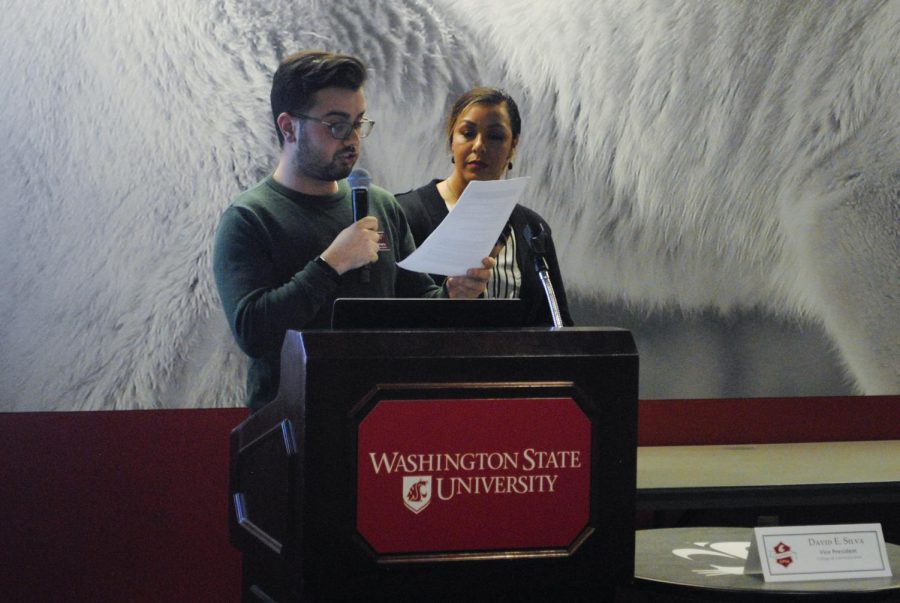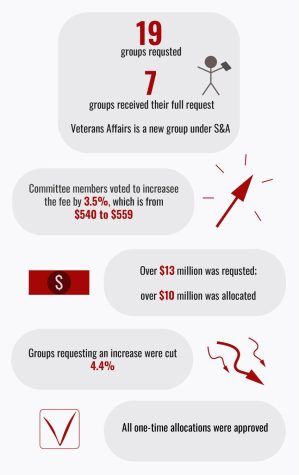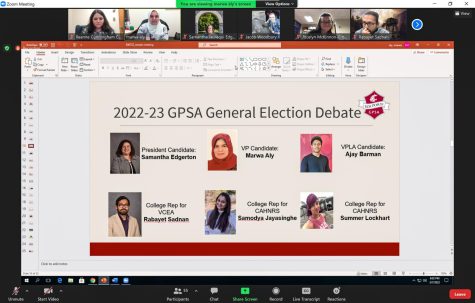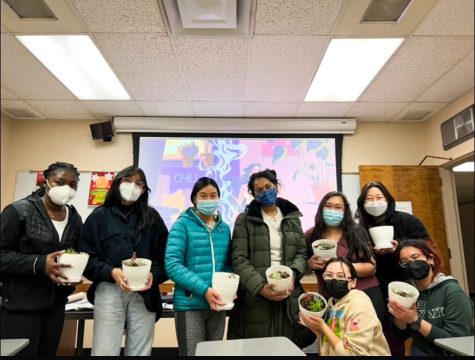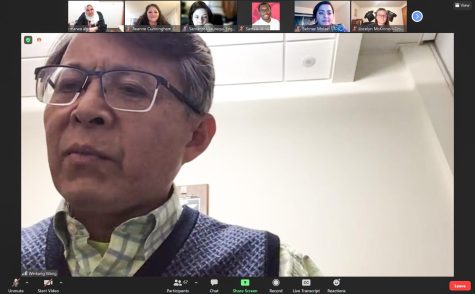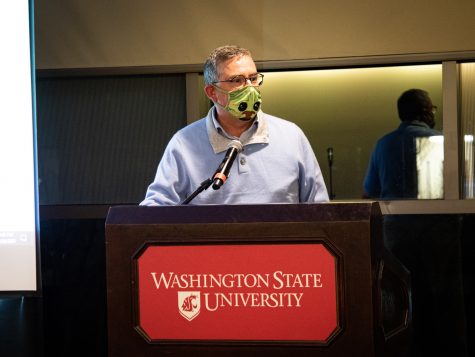GPSA presidential ticket presents plans
Candidates hope to raise stipends, reduce textbook costs, connect with ASWSU
ALYSSA STANFIELD | THE DAILY EVERGREEN
Ralph Chikhany and Veneice Guillory-Lacy, Presidential and Vice-Presidential candidates respectively, tell attendees why they would be the best choice for next semesters positions at Monday’s GPSA meeting in Butch’s Den.
March 5, 2019
The only presidential and vice presidential GPSA ticket presented their plans for the future in a meeting Monday night.
GPSA senator and presidential election polls opened Monday at 7 p.m. They will close on Friday at 5 p.m. Graduate and professional students can vote at https://studentvote.wsu.edu.
Ralph Chikhany, a third-year mathematics Ph.D. candidate, is running for president. His running mate is Veneice Guillory-Lacy, fourth-year Ph.D. candidate from the cultural studies and social thought education program.
Chikhany has served as a GPSA representative for the last two years.
Chikhany said they would like to increase senator stipends by 20 percent, which is $50, if not more.
They also plan to start an endowment, which will help students with textbook costs. However, Chickhany said, if that does not happen, they want to persuade departments to use open-source textbooks because everything students need is online.
The pair wants to include small research and dissertation grants too, Chickhany said.
Two newsletters are sent out weekly: The Friday Focus and the Monday Minute. Chickhany said they would like to decrease that number to one because it costs $100 for the Monday Minute to be sent out, especially because there is some of the same information included in both newsletters.
“I just want put our name out there,” he said. “I think once we start putting our name into events that are not just within GPSA, so stuff that the Student Entertainment Board does, [and] we can increase and make our connections with ASWSU better, that will help us promote ourselves better.”
He said there should be more senator seats for people who are not completely represented by their departments, meaning more seats for people of different identities, ethnicities and cultural backgrounds.
“It has to be the norm that all of our events, all of our initiatives are culturally diverse,” he said. “If you want to have an event that celebrates your culture or identity, we’re going to support you.”
Guillory-Lacy said she has experience with leadership roles and advocacy. She has been a part of multiple WSU committees and on the executive board of Young Women’s Christian Association. She said both she and her running mate adapt to change easily and work efficiently.
“We’re committed to being excellent team players and always open to your feedback. We want to know what’s going on,” Guillory-Lacy said.
Representatives are running to become directors of committees to make up the GPSA executive board for each college. They also discussed their platforms. For more information, go to the complete GPSA guide.
Pullman Police Chief Gary Jenkins and Dawn Daniels, WSU Police Department operating sergeant, spoke to GPSA. One question from a senator was asked about de-escalation.
“I know we’ve looked in the department at our defensive tactics, and we still need to be effective with them to make sure nobody gets hurt, whether it’s a suspect or an officer,” Daniels said. “A lot of times, we don’t go in with the notion that we’re going to beat the bejeezus out of somebody. We go in to try and control them.”
Jenkins also said the Pullman Police Department implemented body cameras a few years back to try to be transparent. The Pullman Police conduct reviews when force is used by a police officer. They define ‘force’ as anything that uses force, even something as small as holding someone’s arm when putting them in handcuffs.
Another question was asked about sleep deprivation and whether the police departments take that into account because that affects a police officer’s use of force.
She said sleep deprivation is something they take caution to prevent. They do not schedule people to work longer than 12 hours, but on occasion it does happen that someone works longer than that, like when there were bomb threats a few years ago, Daniels said.
Another question regarded how the police can help students who may had bad experiences with police overcome their fear of reaching out to them.
Daniels said that the best thing she can do is talk to groups and do programming and try to explain what the law is in Washington in regards to things like traffic stops because the law differs from state to state. The department does this with things like sexual assault, domestic violence and fights. She says they’ve seen success with this method.
“We hire people and they have bad days and sometimes they do things they shouldn’t be doing,” Jenkins said. “We keep all of our officers accountable.”
If there is a complaint lodged against an officer, the department does an investigation. They review body camera footage and interview people, Jenkins said. If someone does not feel that they have been treated with dignity and respect by a police officer, Jenkins said, they want to know about it.
This article has been updated to reflect that those running for representatives spoke to the senate, instead of those running for senators.

